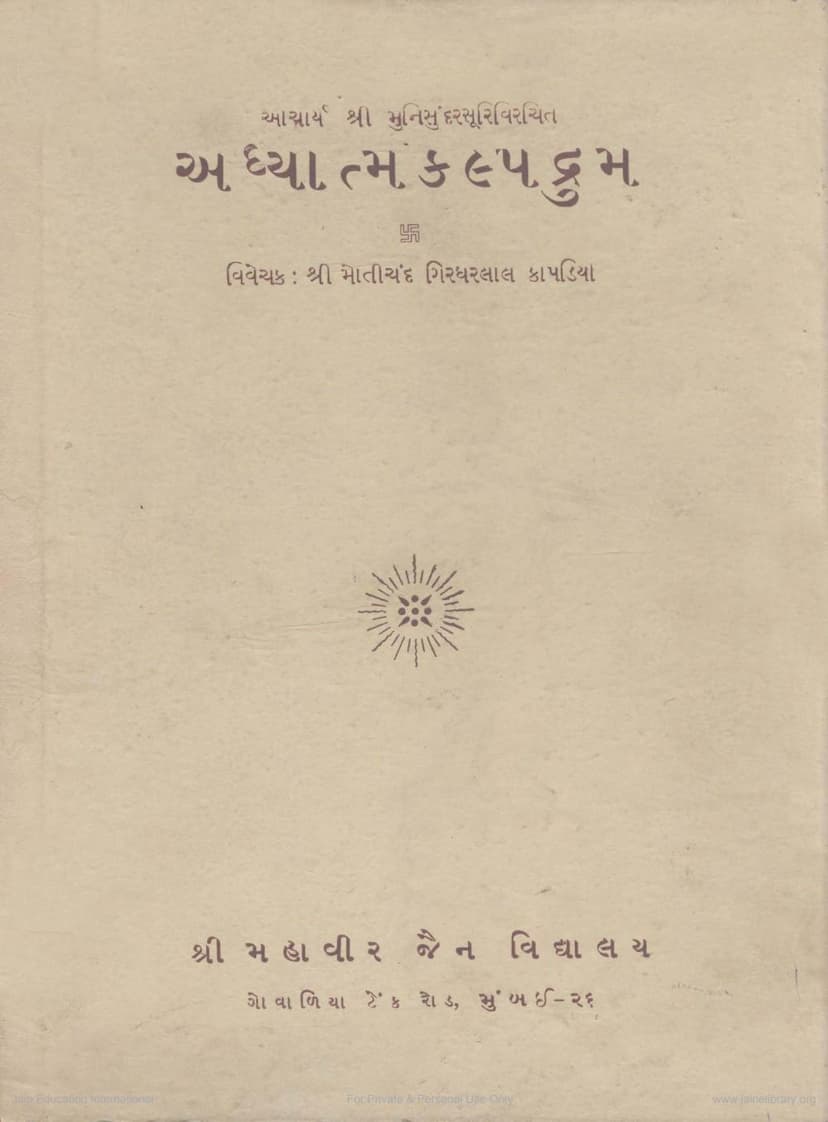Adhyatma Kalpadrum
Added to library: September 1, 2025

Summary
This is a comprehensive summary of the Jain text "Adhyatma Kalpadrum" by Motichand Girdharlal Kapadia, based on the provided pages. The text is a commentary and explanation of the original work by Acharya Muni Sundarsurivara.
Overall Summary:
The book "Adhyatma Kalpadrum" (Spiritual Wish-Fulfilling Tree) is a profound Jain text that delves into spiritual knowledge and detachment. Authored by Acharya Muni Sundarsurivara and critically reviewed and commented upon by Shri Motichand Girdharlal Kapadia, the book aims to guide readers towards spiritual peace, purity, and elevation. Published by Shri Mahavir Jain Vidyalay, this particular edition is the seventh printing, released in July 1986.
The text is structured into sixteen chapters or "Adhikaras," each focusing on a distinct aspect of spiritual discipline and detachment. The commentary by Motichand Kapadia is highly detailed, offering in-depth explanations, historical context, and philosophical insights. The work is lauded for its ability to make a dry subject like spirituality accessible and engaging to a wide audience, a testament to Kapadia's exceptional writing skill.
Key Themes and Chapters:
The book progresses through a series of spiritual principles, starting with the foundational concept of Samata (Equanimity). It then systematically addresses the shedding of attachments and desires related to:
- Samata (Equanimity): Emphasizing the importance of maintaining mental balance amidst all circumstances, the text explores the nature of true happiness, the necessity of self-reflection, and the profound benefits of equanimity in achieving spiritual goals and ultimately, liberation.
- Detachment from Attachments (Mamatva Mochana): The book systematically discusses detachment from:
- Women (Stri): Analyzing the deep-seated attachment to women, its potential pitfalls, and the need for detachment.
- Children (Apatya): Explaining the emotional bonds with children and the spiritual imperative to overcome them.
- Wealth (Dhana): Discussing the transient nature of wealth and the dangers of its attachment.
- The Body (Deha): Highlighting the impermanence of the physical form and the folly of excessive attachment to it.
- Renunciation of Sensual Pleasures (Vishaya Pramad Tyaga): This chapter focuses on understanding and abandoning the allure of sensory pleasures, which are deemed ultimately detrimental.
- Control of Passions (Kashaya Nigraha): The text details the destructive nature of passions like anger, pride, deceit, and greed, and provides guidance on controlling them.
- Study of Scriptures (Shastra Abhyasa): Motichand Kapadia's commentary stresses the importance of scriptural study not just for intellectual knowledge but for its practical application in life.
- Mind Control (Mano Nigraha): Recognizing the mind as the root of both bondage and liberation, this chapter offers techniques and insights into mastering the mind.
- Vairagya (Detachment/Renunciation): This theme runs through the text, emphasizing the need to detach from worldly pursuits and cultivate inner peace.
- Purity of Religion, Teacher, and Practices (Deva-Guru-Dharma Shuddhi): The text emphasizes the critical importance of discerning and adhering to the true principles of Jainism, recognizing the purity of divine principles, the guidance of a genuine teacher, and the righteousness of the spiritual path.
- Right Conduct (Shubha Vritti): This section offers practical advice on cultivating virtuous actions and aligning one's conduct with spiritual goals.
- The Ultimate State of Sameness (Samya Sarvasva): The concluding chapters reiterate the paramount importance of equanimity and its role in achieving the ultimate goal of liberation.
Motichand Kapadia's Contribution:
Motichand Kapadia's commentary is highly regarded for its depth and clarity. He meticulously translates the original Sanskrit verses and provides extensive explanations that illuminate the complex philosophical and spiritual concepts. His work is characterized by its ability to connect abstract spiritual ideas with practical life, making the teachings of Muni Sundarsurivara relatable and actionable for the reader.
Historical Context and Legacy:
The book's preface and introductory notes provide valuable historical context, highlighting the societal conditions and religious landscape during the time of Acharya Muni Sundarsurivara and the impact of Motichand Kapadia's work. The text has seen multiple editions, indicating its enduring popularity and significance in the Jain community. The publisher, Shri Mahavir Jain Vidyalay, has played a crucial role in making this profound spiritual work available to the public.
In essence, "Adhyatma Kalpadrum" with Motichand Kapadia's commentary serves as a spiritual guide, offering a path towards self-realization and liberation by emphasizing detachment, equanimity, and righteous conduct, all rooted in Jain philosophy.